Interview: DivKid On Getting Started With Modular Synths And Building Your Own Setup
Hollin Jones on Jun 28, 2017 in Interviews | 0 comments
AA: Hi Ben! Thanks for taking time away from what must be a mountain of patch cables to talk to us. Let’s start at the beginning. How did you first get interested in modular gear?
BW: My interest in modular came as a result of a fairly short and quick move ‘out of the box’ that started with controllers, then desktop synths and finally went onto vintage synths before going modular. Prior to that I’d been through a guitar pedal phase long before any interest in synths and I really liked re-amping and recording soft synths through amps and pedals with the production work I was doing at the time. So as I got into desktop synths that often sounded good but lacked a good interface, I started searching the web for vintage synths and got a real bug for it.
They took up a lot of space though and a case of modular that could be exactly what I wanted, patched how I wanted really started to appeal. I got hooked on really learning synthesis too and modular is perfect for that. I’m fascinated with the constant learning and nature of it all and that keeps it rooted firmly at the front of what I’m doing.
It can be kind of an expensive hobby. What is a good place to start, for someone who’s just getting into the world of Eurorack but doesn’t want to spend a fortune?
I think the best way to start is to buy a case a bit bigger than you think you’ll need! A good friend, Ross Lamond (he makes amazing bespoke cases) once called the gear lust for modular a fever and it really is. Once you have the fever you’ll be putting a lot of energy and no doubt money into it. So get a slightly bigger case than you think you’ll need. I’d suggest really learning synthesis if you’re already using software or other hardware for music in some way as it will really help. Even those that think they have a great grounding and would say they fully understand synthesis will be learning a lot getting into modular as it presents all the behind-the-scenes elements of synthesis in both hardware and software in a way most of us haven’t experienced before.
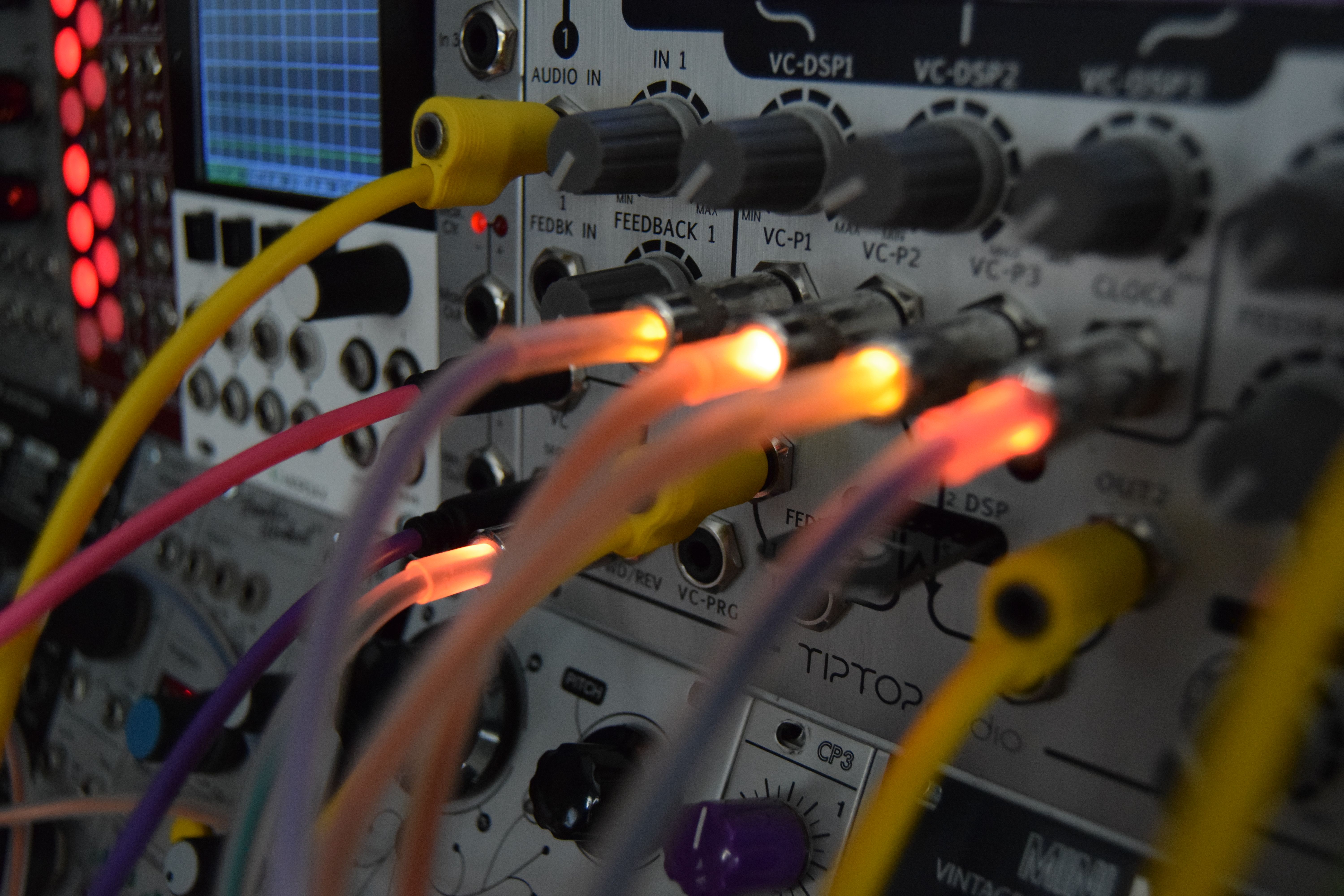
When talking to people about getting into Eurorack I always like to quote Olivier Gillet from Mutable Instruments who broke down the idea of needing the typical building blocks of a VCO into VCF into VCA with an LFO and envelope generator (which is the usual response people go to) into a modular simpler approach. He said (in similar words) you need a sound source, a processor and a modulator. That really is all you need to get started. Something that makes a sound, something that can modify it somehow and something to animate the processing and sound.
I really delved into this idea of only using 3 modules with Modular Podcast where we made a show based on the challenge of creating patches only using 3 modules. As Modular Meets I hold events in the UK with manufacturers and users coming together for a geeky afternoon of modular and there’s always new faces that see these towering systems and imagine a heavily drained bank account getting into it. That isn’t the case at all and that’s what the 3 module challenge aims to promote. You can create some amazing sound design and music with only 3 modules. So I’d recommend people check that out.
I’d recommend buying second hand to start with if possible as modules hold their value well so it’s a ‘safe’ way to go as you can sell things and move them on to others in trades if you feel it’s not for you. The best way to get into it I think is to buy in small collections at a time which helps not burning through a load of cash and more importantly means you can learn a couple of modules at once and really master them. Knowing exactly what your modules can do and how they react means you can better inform your next purchases to keep making the most out of the modules.
You look like you’ve got a lot of gear. Can you run us through some of your favourite equipment, and why you like particular models?
With the video work on my YouTube channel my modular set up has certainly grown rather large over the past few years. I’ve said a few times both privately in conversations and publicly that I think the 4ms DLD is one of the best modules ever made. That’s a big statement and of course a personal one as it’s all subjective but the DLD really is a stunning device. I use it with modular, drums, foley recordings and ambient sounds as well as live input from an electric guitar. It’s a fantastic dual delay that can work in stereo or as two independent delays. But the beauty of it is that it’s also a looper and it moves between delay and looper seamlessly.
It can do audio rate karplus strong style synthesis, delays up to nearly 3 minutes per channel and it also takes modulation perfectly. Modulating delay time has none of the pitch shifting analogue delay style artefacts (which have their place) and is super clean. This video from me I feel really shows it off in a piece of music that has inspired a potential album coming in the future. It’s from the #3modulechallenge I mentioned above and features Mutable Instruments Rings going into the 4ms DLD with the Steady State Fate Ultra Random Analog in control of everything. You’ll also hear my poor cheesy David Attenborough impression in the intro too.
I’ve got lots of favourites, probably too many to name but I’d also like to say that the AJH Synth MiniMod voice is hands down one the best synth voices I’ve ever heard. Based around a MiniMoog Model D it has obvious connections to east coast subtractive based synthesis but the FM, sync and audio rate modulation possibilities mean it can really hold it’s own in a more west coast Buchla style patch too. I’m often hesitant to name favourites and mention names as it changes regularly and to be honest there’s an amazing amount of very good gear in the Eurorack format.
How do you record? Do you use a DAW synced to your system, or do you avoid computers altogether? There’s a few ways you could go about this is the majority of your sound generating gear is in hardware format, and also uses its own sequencers.
I’m recording all the time, mainly for demo videos at the moment but I’m working on some modular based music too. Over the past few years I’ve been composing and producing work for media libraries with TV and media sync use as the focus. I really enjoyed that but I’ve not managed to get any modular really as the focus for any of it so far. I have some more straight techno modular that I’ve multitrack recordings of based on performances of patches as well as some more abstract pieces such as the #3modulechallenge patch video I shared above. I don’t often sync to a DAW anymore. It’s only a couple of clicks and a patch cable or two away but I tend to start on the modular and then not bother going back to the core of the patch to sync it up.
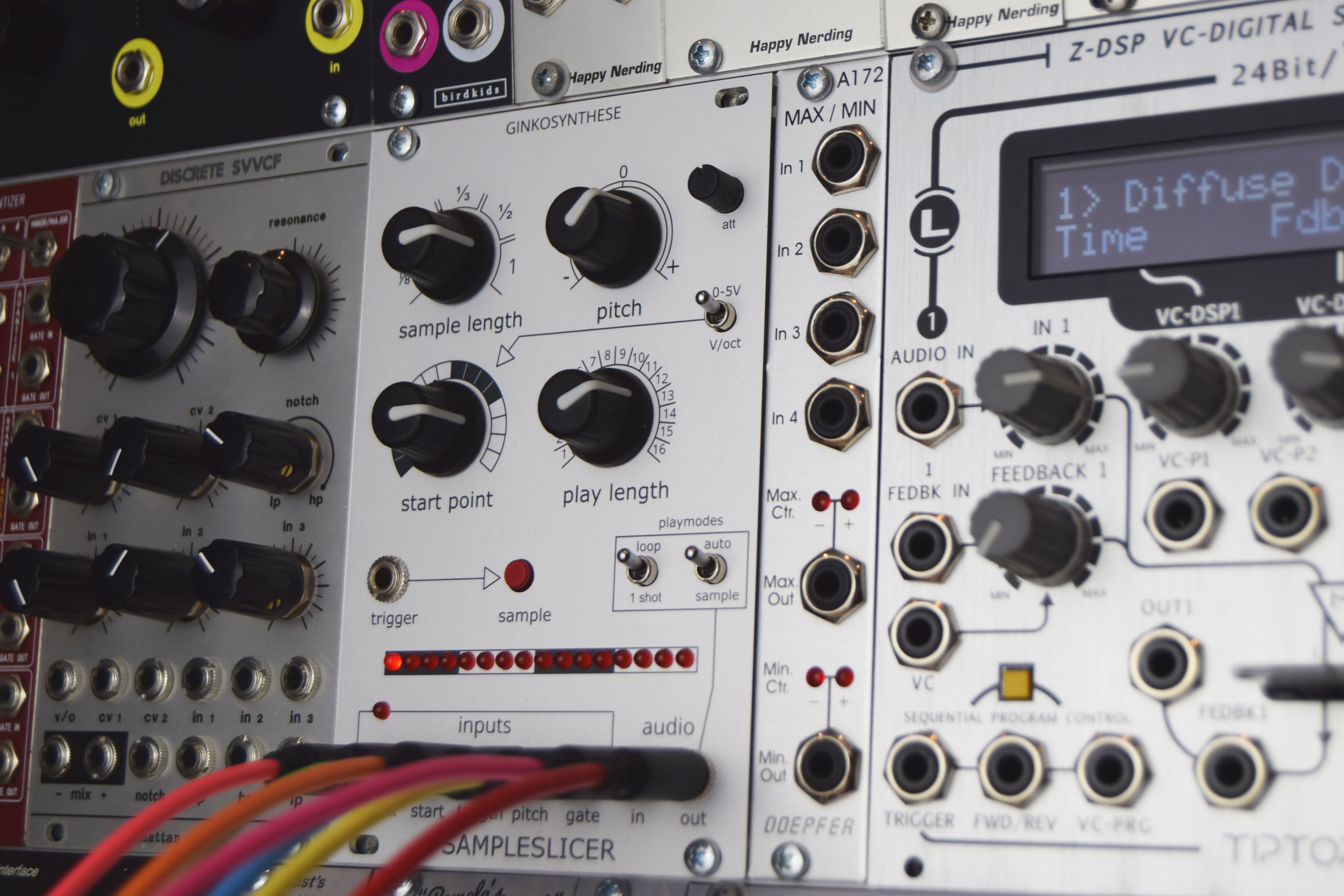
Since getting into modular I’ve had the Vermona qMI which is a quad MIDI interface which allows me four voices of MIDI (yay for chords!) as well as clock syncing to the DAW. That’s been great and a solid way to work when I’ve wanted to. I’ve played around with the Expert Sleepers modules for syncing which is a great way to integrate a computer too. With the new music I’m working on I’m recording a stereo performance of a patch with the WMD Performance Mixer at the hub of the patch and then also taking 6-8 more stems of audio out to record directly at the same time. That means I can capture the moment and feeling in the stereo mix while also taking out important elements such a some of the drums and FX so I can better work the production of those elements in the DAW if I want to.
I don’t feel I can fully perform every little element I want in terms of my own composition and production work so once those initial parts are recorded I’ll use BPM detectors (Logic has a one built in) to get a project in sync and record new parts over the top in sync if I feel the need. But more often than not I’ll play back the initial stereo performance and jam over the top just making sure I hit play in time with what I’m hearing. It’s quicker and I can sync things up and move audio around in blocks afterwards if needs be.
Obviously you’re a fan, but objectively speaking, why do you think modular hardware has become so popular in recent years? Are people yearning for something “real” and tactile amid all the software?
Trying to remove myself from modular as a focus takes me back to getting into it and it was staring into a screen that was often so much of my daily workload that made me want to get into hardware. Lots of people sit at a computer for hours a day, so adding a few more hours in front of it to make music doesn’t appeal to everyone. I think a big part of it is also that inner itch that is scratched with constant learning. Modular offers an environment for endless learning which is a big appeal for me. No two modules do exactly the same thing and they don’t always behave how you’d expect and in a repeatable manner so it feels more spontaneous and ‘alive’ as a process. There’s no doubt that it offers an amazing tactile interface with everything at your fingertips all ready to grab and tweak on the fly.
I think the other side of it is that even those that already only use hardware (so they have the real tactile interface stuff in their setups) have to use the manufacturers’ ideas of what that product should be. If you want to build a Moog clone but have 4 oscillators instead of 2 or 3 you can. Or maybe you want to recreate an MS20 but have 3 envelopes instead of 2. Modular allows you to do all this. The beauty of it comes I think when you move away from totally recreating something and just make your own instrument. Your choice of sound generators, processors, modulators, FX and most importantly utilities (they bring everything to life) that create a uniquely voiced instrument that is your own. I think that’s a lot of the appeal too.
How do you rate small, independent manufacturers versus some of the bigger ones that are getting in on the act? Does small and boutique always mean better or do they all have their place?
It depends on what we’re calling small and independent and who we’re calling bigger. I think nearly all of the modular companies you can call small and independent compared to other music tech companies. I think the independents (let’s just say all modular companies compared to the larger music tech companies for now) can explore their own ideas more freely without the worry of financial repercussions. The market seems happy to go along with the more oddball and out there ideas that a big company couldn’t afford to risk time and development money on. That said we do have larger and smaller modular companies. You’ve got guys hand-making 20 modules or so and selling them direct as well as people doing larger runs of modules in the hundreds (which is small still compared to most things music related) through dedicated manufacturing facilities some owned by modular brands themselves in the states.
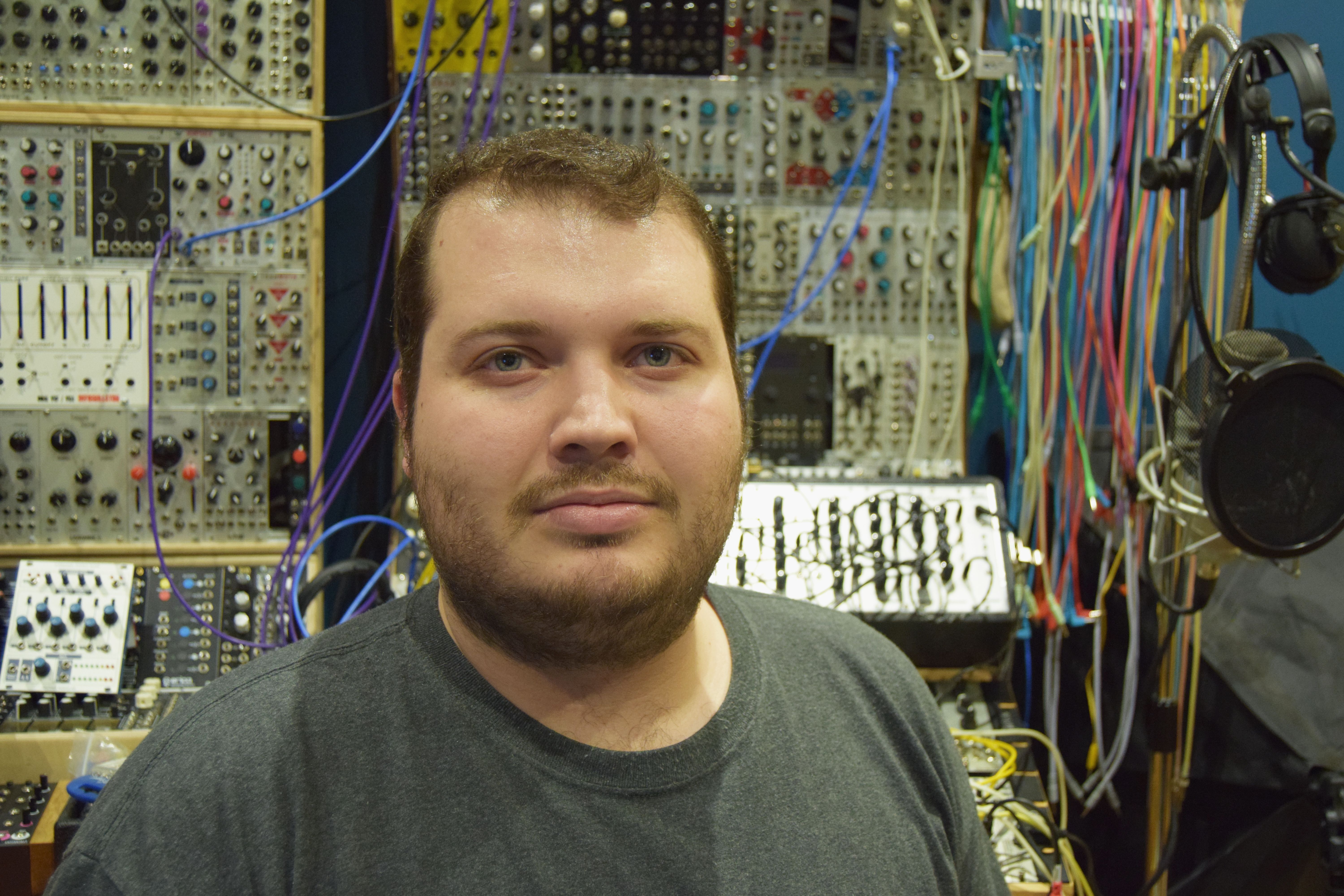
To actually answer your question though I don’t think smaller means better in anyway, nor does bigger mean better. The small guys are producing modules that are both clones or tweaked versions of tried and tested ideas as well as new unique ideas in a range of quality and quantity levels and the bigger guys in the modular scene are doing similar things too. A big problem for the bigger and smaller companies is the size of the market. I think at this point we’re seeing so many new companies and people pop up with ideas and modules to release that it’s growing beyond the market that’s there to support it. The market and user base is still growing and I think it will continue to do so but as it grows things will certainly become more saturated for everyone.
You have produced three great courses on different aspects of working with Eurorack gear. Can you tell us a bit about each of them and what viewers will learn by watching them?
These first three courses explore the audio side of patching, aiming to give people a solid grounding in the fundamentals of audio in a modular system.
The first course “Eurorack 101 Oscillators and Noise” explores a range of analogue and digital oscillators looking at wave forms, modulation and the standard features you would see on a range of modules. It then looks at some specific modules that approach things differently like Braids from Mutable Instruments and the Loquelic Iteritas from Noise Engineering. It also covers the use of noise as audio looking at noise types, how they sound and also pushing noise further and using noise based random as modulation.
“Eurorack 102: Mixers and Filters” takes the obvious next step from oscillators and noise into mixing and filtering audio. Mixers are often forgotten about as a simple basic building block that’s not exciting but we explore create new waveforms with audio mixing as as well as looking at the difference between linear and exponential responses in mixers. We then introduce filters, what they do, how they work and what sounds they create exploring low, high and band pass as well as notch filtering. Taking things beyond those basics we explore self oscillating filters and 1v/oct tracking with filtering before going into different filter flavours with Moog Ladder, Oberheim SEM style multimode, Polivoks and State Variable filter designs from various companies.
The third course “Eurorack 103: Complex Audio & Patching” takes things beyond the basics looking at wave folding within complex dual oscillator modules as well as wave shaping with feedback, rectification, wave folding, FM (frequency modulation) and Phase Modulation. All of these allow more complex tones to be created as well as more tonal options for modulation in patching. We then look at VCAs for audio as well as Low Pass Gates before going onto creating patches. The course explores basic subtractive patching and the east coast sound as well as patching FM west coast style.
What's a good way to get experience of more advanced modular gear without buying it for yourself? This will be a barrier for some people. Are there clubs where you can do this?
The best way to get your hands on modules and full systems to play with is by looking for local synth meets in your area. I mentioned Modular Meets which is the name for the events I hold but there’s plenty all around the world now. The modular community is an amazing and vibrant friendly community willing to share ideas. Every event I’ve held or been to has had a great range of people of all ages and backgrounds and it’s great to see new people coming through and getting a chance to play with stuff. I’ve never seen anyone tell someone not to play with or touch the gear (unless they’ve had a specific patch set up for a performance etc).
A good place to start is by joining some of the Facebook groups, joining the Muff Wiggler forum (then going to the gatherings and events forum) and also speaking to the people in any of the stores that sell modular near you. For those that are more local to me in the North of England I do teach one to one sessions with modular and also offer Skype lessons for consultancy type talks with people getting set up or to explore patching users own systems and teaching functions and concepts. I’m happy for anyone to get in touch with me to chat across the various social media pages anytime. If you hadn’t guessed with the amount of videos I make I’m happy to talk about this stuff!
Where do you think the Eurorack industry is heading? Are we likely to see endless variations on VCOs and VCAs? Is there a bold new direction that designs could go in?
I think as new people get into making modules we will continue to see endless variation and to be honest simple repetition of the basic VCOs and VCAs we’ve had before but we’re already seeing a lot of new and some innovative products with the welcomed developments in digital technology in the format. That’s not to say I’m against someone remaking an old VCO design as some people simply dream of having a full set up of their own and while one or two products maybe more unique they will require the extra utilities to make the most of them. I can’t think of a bold new direction in terms of where I’d like to see it go. I think the marriage of very simple building blocks that look back to the core origins of modular and more complex digital systems offers endless variety and exploration in tone, modulation and control of sound. So on that note I think it can keep going as it is before anything needs to change direction for a while.
Last but not least – why should people get into modular rather than, say, just running software versions on their computers?
People should get into modular if they want a real tactile interface and to feel like they are interacting with sound on a more basic level allowing for greater exploration. That said I don’t think it’s for everyone. If you get frustrated when things don’t do what you think they should (based on preconceived notions from software maybe) and you simply want things to do one thing and do it well then maybe modular isn’t for you. Looking at the influence of Serge modular systems something like a dual slope generator can be a filter, envelope generator, LFO and slew limiter. That’s all defined in the patching, but it means exploring and setting a lot of time aside to really learn a system. That could be incredibly frustrating if you’re just looking for some cool hardware boxes to jam with over drum machines or against a DJ set up … but it could also be amazing!
I’d like to shout out Reaktor Blocks from Native Instruments which I think is a great software option for modular based sound creation and exploration. That would be a great way for people to learn about signal flow and patching. It certainly keeps me happy when I can’t be around my modular set up but have a computer on hand. I’d encourage people to explore all options as everything is subjective. Try software (grab a trial version first maybe) then even try integrating it with a hardware set up to get the best of both worlds. Or start with a small hardware modular set up and see where it leads them.
Exploring things like guitar pedals alongside synths allows for cheaper FX additions to a system for things that you might not feel need the benefit of CV in a modular rack too. The short answer (I’m not known for those as everyone can no doubt tell at this point) is that you should get into modular if you want to create a unique, real hardware instrument that you can continually adapt and tailor to your own needs and requirements. It allows you to mix and match from various ideologies of synthesis and patch them in a way that other hardware doesn’t allow you to make. Software versions can recreate a lot of the sounds very well now but you can’t reach into the screen and physically patch and interact in the same way, I’d encourage people to get out and try it where possible.
Check out DivKid's courses in the Ask Audio Academy for much more detail on working with Eurorack gear.
Eurorack 101: https://ask.audio/academy?nleloc=course/2458/oscillators-and-noise
Eurorack 102: https://ask.audio/academy?nleloc=course/2466/mixers-and-filters
Eurorack 103: https://ask.audio/academy?nleloc=course/2488/complex-audio-patching


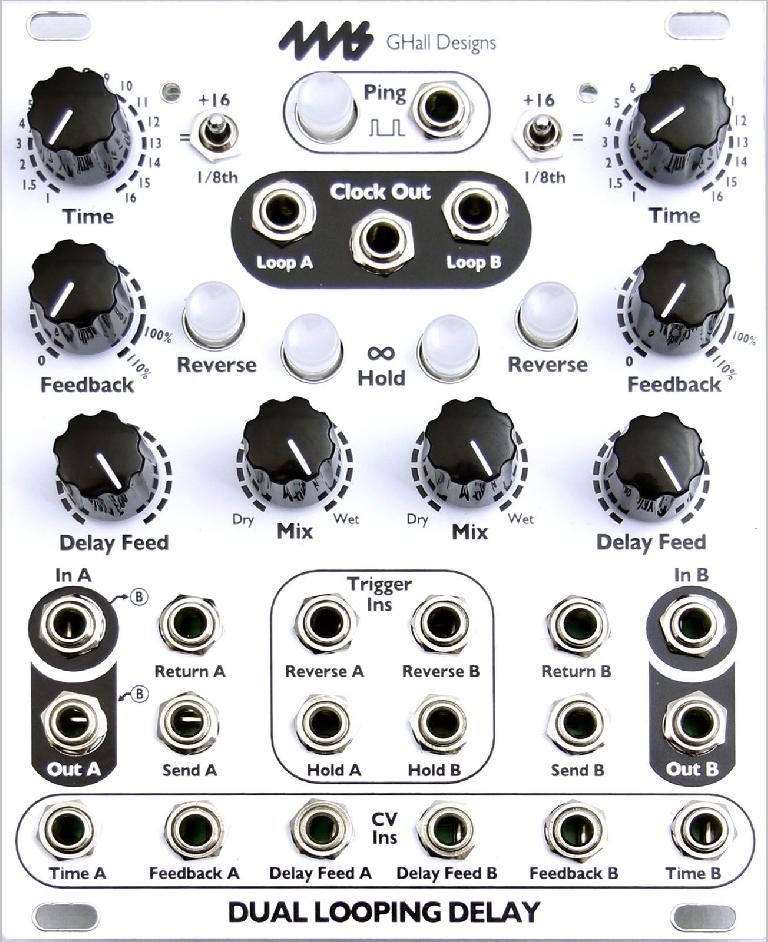
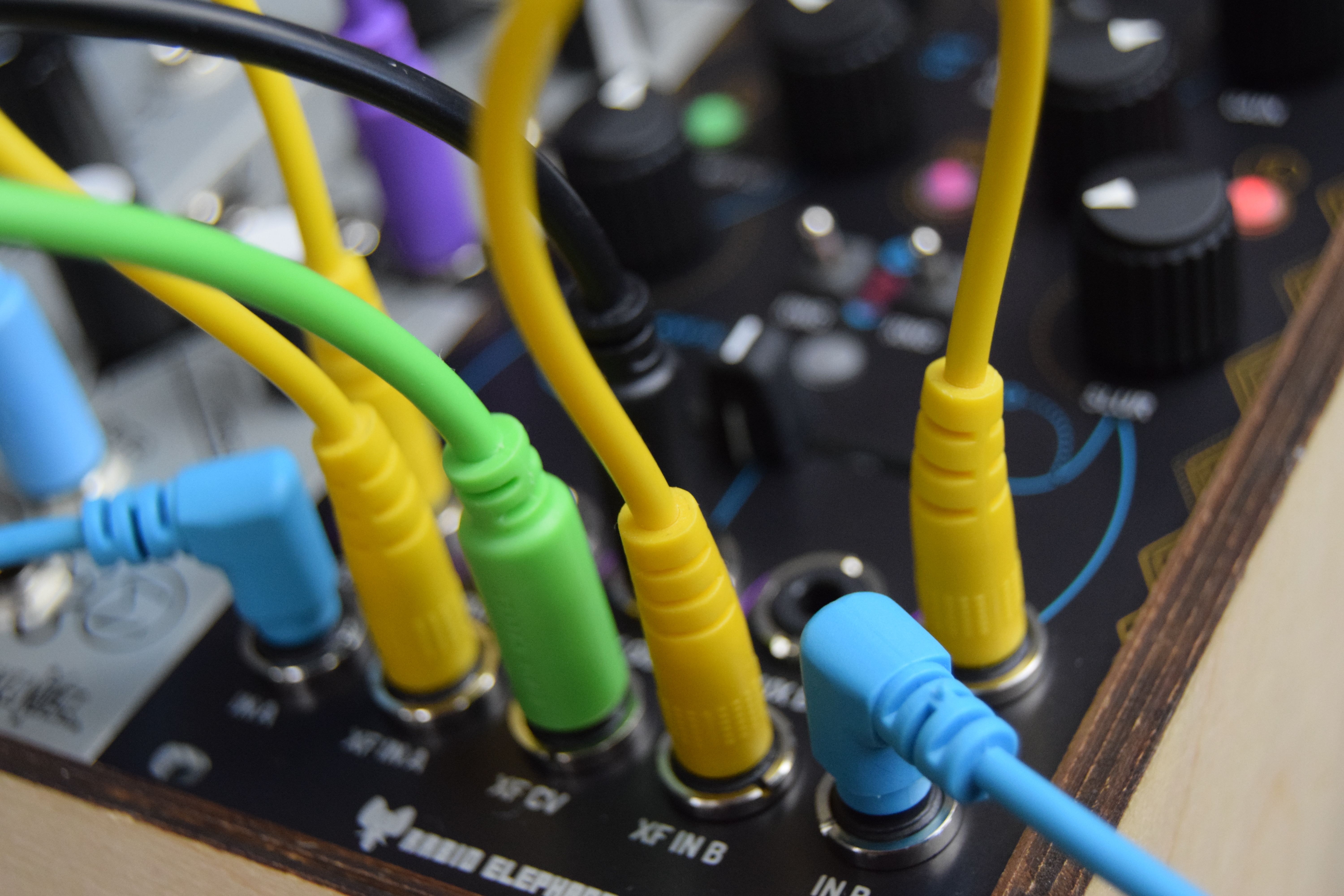
 © 2024 Ask.Audio
A NonLinear Educating Company
© 2024 Ask.Audio
A NonLinear Educating Company
Discussion
Want to join the discussion?
Create an account or login to get started!